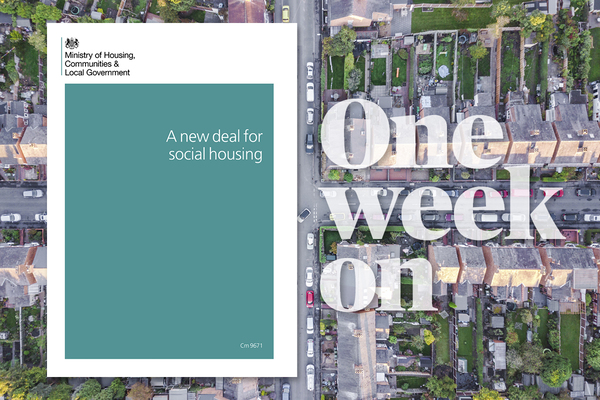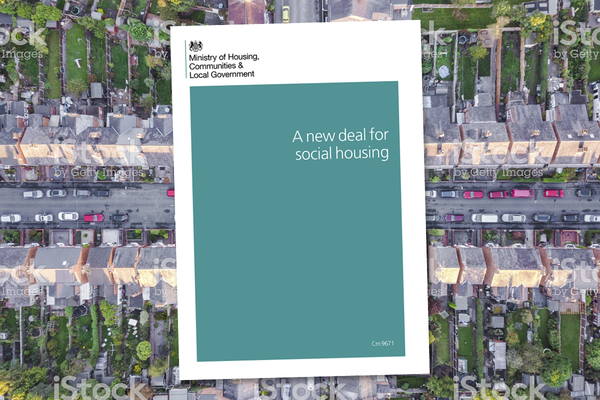You are viewing 1 of your 1 free articles
What England could learn from the Scottish approach to regulation
The Social Housing Green Paper suggests the Scottish approach to regulation could be considered for use south of the border. Ashley Campbell outlines the areas where the rest of the UK could learn a thing or two
The recent Social Housing Green Paper suggested the UK government may benefit from looking towards Scotland for ideas on performance monitoring and regulation.
In their response, our Chartered Institute of Housing colleagues in Coventry called for a regulatory system based on transparency and co-produced with the sector.
Given these asks, we think there is a lot that the rest of the UK can learn from the Scottish approach.
The Scottish Housing Regulator (SHR) is independent of government and has powers to investigate and intervene in the interest of tenants, homeless households and other customers.
Intervention is based on assessment of risk with an emphasis on supporting compliance and good practice.
“We think there is a lot that the rest of the UK can learn from the Scottish approach.”
Performance is measured against 16 outcomes set out in the Scottish Social Housing Charter. These are the standards that all social landlords should be achieving.
The outcomes are based on transparency, communication and engagement, and placing tenants and customers at the heart of service design and delivery.
This focus is not only important in developing trust between landlords and tenants, we know that engagement leads to better, more efficient services and in turn better value for money.
The charter was developed in line with the principles of co-production with significant input from landlords, tenants and other service users. It is updated every five years and you can find the latest version on the Scottish Government’s website.
Each year landlords must submit an Annual Return on the Charter (ARC) based on a set of indicators which measure performance against each of the charter outcomes.
In the spirit of transparency, all of the data submitted each year is published in full on the SHR’s website allowing anyone to explore and compare the performance of any social landlord.
While the volume of data published means that you need to be pretty nifty with Excel to find what you are looking for, the principle of sharing all of the data is certainly welcome.
Publishing data in full also allows organisations such as Housemark Scotland to step in and develop more accessible tools for comparing performance over time and between different landlords. This is an invaluable resource for tenants and landlords.
But what is the result of all of this data collecting and publishing? Data monitoring by Housemark across the UK shows that while tenant satisfaction and service delivery has been declining in England, it has been improving in Scotland with 90% of tenants reporting satisfaction with their landlord’s services.
There is variation between landlords and performance could still be improved across the sector but publishing this information means that issues can be identified and landlords can learn from each other.
“Feedback from our members and other suggested that points or ranking systems can result in landlords focusing too much on their rating and not enough on outcomes for tenants.”
Interestingly, the idea of introducing a rating system or ‘league table’ for the sector came up in recent consultation carried out by the SHR and received lukewarm support at best.
Feedback from our members and others suggested that points or ranking systems can result in landlords focusing too much on their rating and not enough on outcomes for tenants.
We think that our system of performance monitoring and regulation is fair as well as transparent – but of course it could always be better.
The SHR is currently consulting on a new regulatory framework. Suggestions being taken forward include a new Annual Assurance Statement to be submitted by social landlords setting out how they are complying with regulatory requirements or highlighting areas where they know more work is needed.
There are also proposals to provide better support and tools for boards and committees to ensure they have the skills they need to scrutinise their own performance and to explore new ways to make the ARC data more accessible.
If you would like to have your say, the consultation will be open until 14 December.
Ashley Campbell, policy and practice manager, Chartered Institute of Housing Scotland
What the Green Paper says about the Scottish approach to regulation
We think the Regulator is best placed to publish landlord performance in the form of league tables. However other approaches should be considered, including that used in Scotland.
We would also welcome views on whether it would be helpful if landlord performance on key performance indicators is also reflected in a “consumer” ratings system, in addition to the governance and viability ratings, which the regulator currently publishes for larger housing associations.
Is the Regulator best placed to prepare key performance indicators in consultation with residents and landlords? What would be the best approach to publishing key performance indicators that would allow residents to make the most effective comparison of performance?”
Social Housing Green Paper: full coverage
All our Social Housing Green Paper coverage in one place:
Green paper measures are not enough to create May’s ‘new generation’ of council homes Green paper proposals are welcome but much more is needed to support councils to build, writes John Bibby
Green paper shows ministers now see associations as trusted partners Focusing on the failure of the green paper to address supply misses the point, writes Boris Worrall
Government should focus on building on what is already strong Philippa Jones considers the Social Housing Green Paper through a slightly different lens
We need more than a week of delayed announcements bundled together Jules Birch reflects on the government’s ‘Housing Week’ announcements
The regulator should monitor how associations assist homeless people Government announcements this week are positive, but any enhanced role for the English regulator should include looking at homelessness prevention work, argues David Bogle
The regulator’s role should be limited to dealing with systemic failures Julian Ashby suggests the Housing Ombudsman Service should deal with all complaints
The green paper shows ministers are in listening mode Despite some glaring omissions, the government appears to be in listening mode and it is important the sector takes advantage, argues Emma Maier
A short history of social housing league tables Attempts to create league tables for housing associations are nothing new. Mervyn Jones looks at how they have worked in the past
League tables could prove blunt and counter-productive, sector warns Housing figures criticise government proposals to measure social landlords against performance indicators
Government ‘must decide how proactive regulator should be’ on consumer standards Ministers now face a dilemma over the regulator’s focus, sector figures say
The Green Paper: a golden opportunity missed? Melanie Rees assesses the Social Housing Green Paper against recommendations drawn up by the Chartered Institute of Housing and finds the government comes up short
Longer strategic partnerships and guranteed debt to boost social housebuilding The Social Housing Green Paper outlines key ways of boosting supply
The green paper is remarkable progress but it is still not enough The green paper suggests the government appears to be re-writing much of its policy since 2010, but more needs to be done, writes Jules Birch
Green paper marks a ‘milestone’ on resident involvement The government’s recognition residents need clear information is to be welcomed, now it up to the sector to embrace tenant involvement, writes Paul Hackett
Ministers consider stock transfer programme to community-led associations The stock transfer programme could be revived under proposals in the housing green paper
Access to housing grant could be tied to new league tables Grant could be awarded according to how well landlords meet performance indicators, the paper suggests
Ofsted-style regulation of tenant services proposed The government is considering expanding the Regulator for Social Housing’s remit to intervene over tenant services and give it a more “proactive approach to enforcement”
Government proposes dropping one-for-one Right to Buy replacement commitment A consultation paper published alongside the green paper proposes a broader measurement to replace the one-for-one pledge
A list of recent housing policy U-turns The green paper confirms yet more housing policy U-turns from the government, which has spent the past two years dropping policy ideas developed under the David Cameron government. Here is a rundown of the major changes in policy direction
Sector welcomes green paper but calls for more ‘ambitious investment’ Reaction to the proposals, from the National Housing Federation, Chartered Institute of Housing and more
Morning Briefing: reaction to green paper announcements how the media reported the proposals trailed by the government overnight
Government drops plans to force councils to sell higher-value stock The government drops plans to force councils to sell higher value homes
League tables and ‘sharper teeth’ for regulator in social housing green paper Ministers reveal some of the things in the paper ahead of its publication
Grenfell survivors: green paper does not go far enough survivors of the Grenfell Tower fire have said the measures published in the Social Housing Green Paper do not do enough to rectify issues in the social housing sector















